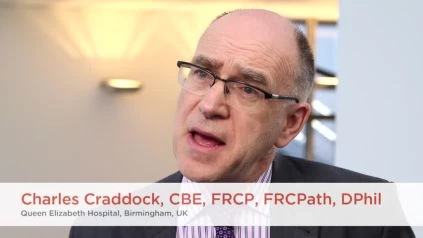Charles Craddock, CBE, FRCP, FRCPath, DPhil, from Queen Elizabeth Hospital, Birmingham, UK discusses when a transplant is the most suitable option in elderly acute myeloid leukemia (AML) patients and what alternatives are open to these patients. Prof Craddock first explains how one can determine the quality of remission using minimal residual disease (MRD) testing, cytogenetic and molecular analysis. He then further explains how patients with a predicted risk of relapse higher than 40% will benefit from an allograft, as well as how co-morbidities scores should be considered when determining whether an allograft is suitable. Recorded at the 2016 Annual Meeting of the British Society of Haematology (BSH) and International Society of Hematology (ISH), held in Glasgow, Scotland
[the_ad id="32629"]

